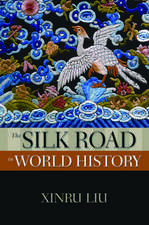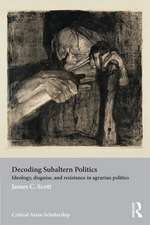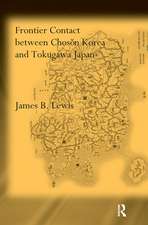Academic Nations in China and Japan: Framed by Concepts of Nature, Culture and the Universal: Nissan Institute/Routledge Japanese Studies
Autor Margaret Sleeboomen Limba Engleză Paperback – 23 dec 2014
Margaret Sleeboom carefully analyses the role the nation-state plays in Chinese and Japanese academic theory, demonstrating how nation-centric blinkers often force academics to define social, cultural and economic issues as unique to a certain regional grouping. The book shows how this in turn contributes to the consolidating of national identity while identifying the complex and unintended effects of historical processes and the role played by other local, personal and universal identities which are usually discarded.
While this book primarily reveals how academic nations are conceptualized through views of nature, culture and science, the author simultaneously identifies comparable problems concerning the relation between social science research and the development of the nation state. This book will appeal not only to Asianists but also to those with research interests in Cultural Studies and Sinology.
| Toate formatele și edițiile | Preț | Express |
|---|---|---|
| Paperback (1) | 456.13 lei 43-57 zile | |
| Taylor & Francis – 23 dec 2014 | 456.13 lei 43-57 zile | |
| Hardback (1) | 765.66 lei 43-57 zile | |
| Taylor & Francis – 20 noi 2003 | 765.66 lei 43-57 zile |
Din seria Nissan Institute/Routledge Japanese Studies
-
 Preț: 287.41 lei
Preț: 287.41 lei -
 Preț: 310.80 lei
Preț: 310.80 lei - 9%
 Preț: 1003.95 lei
Preț: 1003.95 lei -
 Preț: 288.92 lei
Preț: 288.92 lei - 26%
 Preț: 851.21 lei
Preț: 851.21 lei -
 Preț: 485.94 lei
Preț: 485.94 lei -
 Preț: 481.37 lei
Preț: 481.37 lei -
 Preț: 272.49 lei
Preț: 272.49 lei -
 Preț: 411.63 lei
Preț: 411.63 lei - 18%
 Preț: 1035.97 lei
Preț: 1035.97 lei -
 Preț: 406.07 lei
Preț: 406.07 lei - 18%
 Preț: 985.41 lei
Preț: 985.41 lei - 18%
 Preț: 1038.36 lei
Preț: 1038.36 lei -
 Preț: 456.13 lei
Preț: 456.13 lei -
 Preț: 406.90 lei
Preț: 406.90 lei -
 Preț: 475.64 lei
Preț: 475.64 lei - 12%
 Preț: 299.41 lei
Preț: 299.41 lei - 18%
 Preț: 1040.06 lei
Preț: 1040.06 lei - 18%
 Preț: 1082.06 lei
Preț: 1082.06 lei - 18%
 Preț: 1036.98 lei
Preț: 1036.98 lei - 18%
 Preț: 1037.34 lei
Preț: 1037.34 lei - 18%
 Preț: 1145.06 lei
Preț: 1145.06 lei - 15%
 Preț: 527.57 lei
Preț: 527.57 lei -
 Preț: 407.32 lei
Preț: 407.32 lei - 26%
 Preț: 819.05 lei
Preț: 819.05 lei - 15%
 Preț: 500.96 lei
Preț: 500.96 lei -
 Preț: 482.19 lei
Preț: 482.19 lei - 18%
 Preț: 1251.75 lei
Preț: 1251.75 lei -
 Preț: 434.03 lei
Preț: 434.03 lei -
 Preț: 448.58 lei
Preț: 448.58 lei - 22%
 Preț: 341.61 lei
Preț: 341.61 lei -
 Preț: 400.33 lei
Preț: 400.33 lei - 18%
 Preț: 929.74 lei
Preț: 929.74 lei -
 Preț: 404.08 lei
Preț: 404.08 lei - 25%
 Preț: 1000.06 lei
Preț: 1000.06 lei - 18%
 Preț: 1040.06 lei
Preț: 1040.06 lei - 26%
 Preț: 848.44 lei
Preț: 848.44 lei - 26%
 Preț: 819.48 lei
Preț: 819.48 lei - 18%
 Preț: 1035.62 lei
Preț: 1035.62 lei - 18%
 Preț: 1361.84 lei
Preț: 1361.84 lei - 18%
 Preț: 761.96 lei
Preț: 761.96 lei
Preț: 456.13 lei
Nou
Puncte Express: 684
Preț estimativ în valută:
87.29€ • 90.68$ • 72.51£
87.29€ • 90.68$ • 72.51£
Carte tipărită la comandă
Livrare economică 03-17 februarie 25
Preluare comenzi: 021 569.72.76
Specificații
ISBN-13: 9780415864497
ISBN-10: 0415864496
Pagini: 240
Dimensiuni: 156 x 234 x 18 mm
Greutate: 0.36 kg
Ediția:1
Editura: Taylor & Francis
Colecția Routledge
Seria Nissan Institute/Routledge Japanese Studies
Locul publicării:Oxford, United Kingdom
ISBN-10: 0415864496
Pagini: 240
Dimensiuni: 156 x 234 x 18 mm
Greutate: 0.36 kg
Ediția:1
Editura: Taylor & Francis
Colecția Routledge
Seria Nissan Institute/Routledge Japanese Studies
Locul publicării:Oxford, United Kingdom
Public țintă
PostgraduateCuprins
Part I - Framing the Nation 1. Introduction: Framing the Nation in China and Japan 2. The Power of National Symbols: The Might of a Chinese Dragon 3. The Coherent Force of Struggle and Diversity in Chinese Nationalism Part II - Group Categorization 5. Culturalist Categorization 6. Global Categorization Part III - Group Framing Habits and Strategies 7. Grouping 8. Framing the Nation in the Short History of the International research Centre for Japanese Culture (Nichibunken, 1987 - ) 9. Nation-Centred Political Strategies in Academic Thought, Examples from China and Japan 10. Nation Framing as an Academic Strategy in the PRC 11. Core Themes and an Outlook on Future Research
Notă biografică
Margaret Sleeboom teaches anthropology at Amsterdam University and is a Research Fellow at the International Institute for Asian Studies.
Recenzii
'This volume is an important addition to a series of meta-discourses on cultural nationalism in China and Japan as practised in the last decade or so.' - Journal of the Royal Asiatic Society
Descriere
Chinese and Japanese people's descriptions of themselves and each other differ vastly and contrast starkly with Western perceptions. This book explores human categories and how academics classify themselves and the world.















